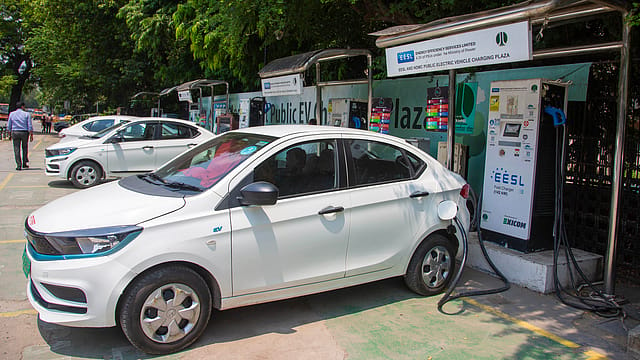Indian car buyers most concerned about EV charging time: Deloitte
ADVERTISEMENT

Around 43% of car buyers in India say the time required to charge an electric vehicle is one of the greatest concerns regarding EVs, according to a survey by Deloitte.
Indian consumers are generally most concerned about charging time, range anxiety, cost, and battery safety, according to Deloitte's 2024 Global Automotive Consumer Study. 42% of car buyers in India say the lack of public electric vehicle charging infrastructure is the greatest concern while 40% of consumers highlighted safety concerns with battery technology.
Expectations for battery electric vehicles' driving range vary significantly across global markets. Only 40% of surveyed consumers in India expect more than 400 kilometres of range, whereas 67% of consumers in Germany expect the same as a prerequisite to consider a BEV as a viable option for their next vehicle, the survey finds.
Consumers surveyed in developed markets are more loyal to brands than those surveyed in developing economies. Nearly 8 out of 10 vehicle owners in India are likely to shift to a different brand for their next purchase, the survey shows.
Slowing EV momentum may be putting current decarbonisation timelines in jeopardy, according to Deloitte. High interest rates and elevated sticker prices may be causing consumer interest in EVs to soften in some markets. Despite automaker price cuts and government incentives designed to make them more affordable, a variety of other challenges continue to stand in the way, including range anxiety, charging time, and availability of charging infrastructure, the study shows.
Meanwhile, consumer interest in Internal Combustion Engines (ICE) vehicles is rebounding in some markets surveyed as affordability concerns continue to weigh heavily on forward intentions.
Price tops the list of factors driving the choice of vehicle brand for consumers in developed markets, including Germany, Japan, and the United States; while vehicle performance (China and South Korea) and product quality (India) are top of mind for consumers in other global markets.
In addition to where the brand hails from, consumers surveyed also consider whether the vehicle is locally produced or not when choosing their next vehicle. In India, 37% of consumers want their next vehicle to be manufactured locally.
Consumers surveyed in developing markets such as India, China, and Southeast Asia are also more willing to pay for connected vehicle services compared to consumers surveyed in markets such as the U.S., Japan, and Germany.
Deloitte surveyed more than 27,000 consumers in 26 countries to explore opinions regarding a variety of issues impacting the automotive sector, including consumer interest in electric vehicles (EVs), brand perceptions, and connected technology adoption.
In most markets surveyed, the main reason consumers intend to acquire an electrified vehicle stems from a strong desire to lower their operating costs – outstripping the concern for global climate change.
An assumption that EV charge times need to be on par with fossil fuel fill-ups may be somewhat overstated as consumers in most markets are willing to wait longer than 10 minutes to refuel, the survey shows.
When it comes to paying for public EV charging, consumers in most markets prefer the familiarity and convenience of using their credit or debit cards.